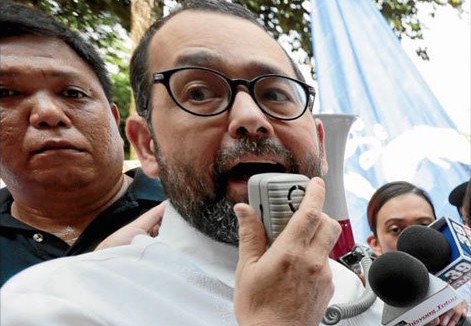CEBU CITY — With at least 4,700 people killed in the government’s anti-drug war, teams from the United Nations and the European Union are coming to the Philippines to investigate the spate of summary executions and the deaths of drug suspects in police operatons, and review the country’s compliance with its human rights obligations.
Commission on Human Rights (CHR) chairman Jose Luis Martin “Chito” Gascon said the United Nations Special Rapporteur on Extrajudicial, Summary or Arbitrary Executions, recently accepted Malacañang’s invitation to look into the deaths in President Rodrigo Duterte’s relentless campaign against illegal drugs.
The Department of Foreign Affairs and the UN will discuss in the coming weeks the dates of the visit as well as the mandate of the Special Rapporteur, according to Gascon.
Most likely, Gascon said the probe would officially start in the first quarter of 2017.
Later in November, a team from the European Union (EU) will arrive in the Philippines to meet with government leaders, businessmen, and economic managers to evaluate the country’s human rights, environmental and labor conditions.
Gascon said the EU would find out whether the country has continued its commitment to human rights and other policies as mandated in 27 international agreements entered into by the Philippines. Of these agreements, 10 involved human right treaties.
If the EU saw that the country has relaxed its commitment to human rights, he said the finding would affect the General System of Preference Plus (GSP Plus) mechanism which has granted the Philippines access to the European market.
“If this team assesses that there is a backsliding or fallback in our commitment to human rights, then the GSP Plus mechanism may be in jeopardy. Since we joined in 2014, there has been significant impact in terms of our exporters and we would want this to continue,” Gascon explained in a news conference at the Handuraw restaurant in Cebu City on Thursday.
Gascon expressed hopes that President Duterte would strengthen ties with other nations and observe due process in his aim to eradicate illegal drugs and crimes.
Some 20 young people from Myanmar, Indonesia, Malaysia, Thailand, and the Philippines signed a manifesto on Thursday to denounce extrajudicial killings.
Gascon was invited to speak during the program.
“Instead of bringing security and the rule of law, we believe that the violent campaign against the drug trade has made the country more unsafe with innocent people killed, drug lords evading arrest, and murder cases rising,” the manifesto read.
“We call on the Philippine government to condemn the murder spree, immediately solve the vigilante killings, act on the failed police operations, and serve justice to the families of the murder victims,” it added
Since July 1 to November 1, the Philippines’ war on drugs has led the deaths of 4,791 suspected drug pushers. Of the number, 3,001 were gunned down by unknown assailants while the rest were killed in police operations.
The U.N.’s Special Rapporteur has the authority to “undertake visits to examine the situation of extrajudicial, summary or arbitrary execution in the respective country, and to formulate recommendations to the government and other actors on upholding the right to life.”
“We hope that the war on drugs and the fight against crimes will be undertaken in a way that is consistent with the Constitution, which guarantees respect for human rights at all time,” Gascon said. SFM
RELATED VIDEO
[ventuno id=’ODM2NDE1fHwyMzY4fHwxMDg2fHwxLDIsMQ==’][/ventuno]


